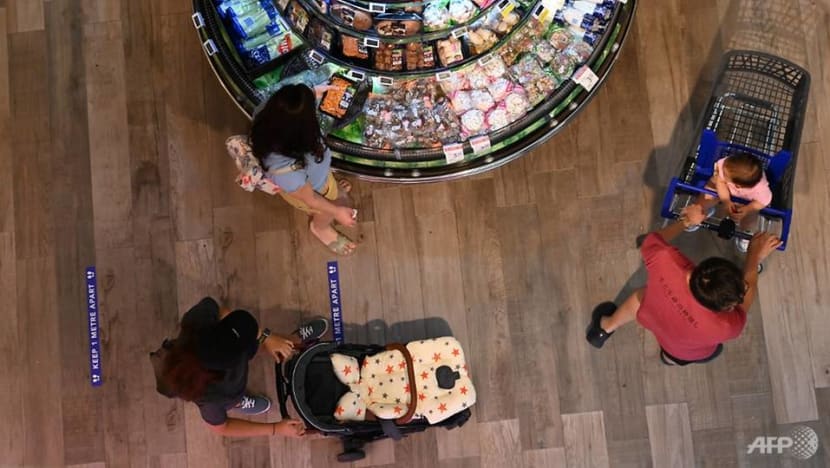How millennials are spending on wellness to look and feel good
Millennials exist in a world of social media and tech gadgets. But despite the digital connection, feelings of isolation also plague many in this generation. To cope, millennials are embracing healthy living and are willing to pay a premium for it. Money Mind reports.

File photo. Millennials are willing to spend and making healthier food choices. (Photo: AFP/Roslan Rahman)
SINGAPORE: The past year has been a period of self-discovery for music artist Narelle Kheng.
Since the pop band The Sam Willows went on hiatus, the 27-year-old has been working on solo music – a trilogy project that tracks her emotional growth and personal development.
Like most other millennials, self-care has been a focal point for Narelle, who has been vocal about her struggles with mental health.
For the most part, her stress comes from wearing too many hats.
“Sometimes you're juggling a lot of projects, and there are some days where there is not a second where your brain can turn off. As a freelancer, there is no cut-off time to work. So you can literally be working from morning all the way until the next morning. And as long as you have stuff to do, you're still going to keep going.”
Commentary: Managing personal finances is a minefield when you start 'adulting'
But Narelle has since learned to slow down and find a balance between work and self-care.
She has promised herself to prioritise her mental health and personal well-being, de-stressing with activities such as meditation, writing a journal, and picking up sports during the circuit breaker.
Coping with anxiety and remaining resilient amid the pandemic have been the main concerns for millennials over the past year, said professional services firm Aon.
The company’s well-being expert Amitabh Deka outlines some of these issues.
“Chronic fatigue, chronic stress is a big area of concern for millennials. And this is more so now, because we are all in our own shells and spaces physically, and often virtually. Many millennials are also now new parents. They are expected to take care of their aged parents as well. So both these factors have further aggravated the stress that millennials are going through. Not to mention the challenges they have for their job security.”
Experts say, as a generation, millennials are motivated to take charge of their physical, social and emotional health and well-being.
A study by market research firm Nielsen that showed that 44 per cent of millennials choose healthy living to avoid high medical costs in the future. They want to remain mobile in old age (40 per cent) as well as be in good health so that they can pursue personal goals (49 per cent).
The survey also found that millennials are buying more vitamins, supplements, organic and gluten-free products. They are also paying close attention to nutrition information in food labels.
"They are very willing to spend and they are actually eating healthier," said Ms Adriana Chia, director of customised intelligence Singapore at Nielsen.
"They want to look good on the outside and feel good on the inside," she said.
Commentary: Millennials aren’t the only ‘burnout generation’. Just ask the rest of us
This is a trend benefiting businesses such as Yumi Active.
The home-grown workout apparel brand said it saw 40 per cent growth in 2020, despite an overall contraction in the retail sector.
Even though face-to-face activities were limited for public health reasons, many customers turned to digital outlets to facilitate their home workouts.
Yumi Active started in 2018 and carries workout apparel that is priced between S$52 and S$98.
The products feature Asian prints and custom-made fabrics.
According to founder Diana Chang, about 70 per cent of its customers are in their 20s and 30s.
Popular products include leggings, as well as other comfortable workout attire that doubles up as casual wear.
Yumi Active stands on a sweet spot as the global athleisure market is set to hit US$247.1 billion by 2025, from US$175.2 billion in 2020.
The segment is forecast to grow 6.7 per cent annually as sportswear becomes increasingly acceptable in various social settings.
Yumi Active’s next move is to develop eco-sustainable fabric and make its products available outside Singapore.
Commentary: Call me a strawberry millennial, but being passionate doesn’t mean I’m willing to be exploited
Even as millennials make their own lifestyle choices, many firms in Singapore are also stepping up to fill the wellness needs of the millennial workforce.
Aon’s Amitabh Deka said: “Companies are now making sure that their core offering is very, very specific to the element of care. For instance, when they're looking at physical activities they are ensuring that there are competitions or gym memberships where people can sign up to.
"In terms of mental health, organisations who did not have employee assistance programme providers have quickly gone ahead to (do so). They are providing abilities to get mental health coaches or providing digital experiences through mental health apps.”
Technologies that offer convenience in tracking health goals will be valuable for millennials, said Nielsen.
“What businesses can do is give them something that they can integrate into their lifestyle. So that they can track what they are eating, how many calories they consume. How much exercise they need to do on a daily basis,” said Ms Chia.
As millennials grow older, the demand for wellness products and services is only set to increase, meaning that businesses that gear up for this growing demand are well-poised to tap on this wellness wellspring.















